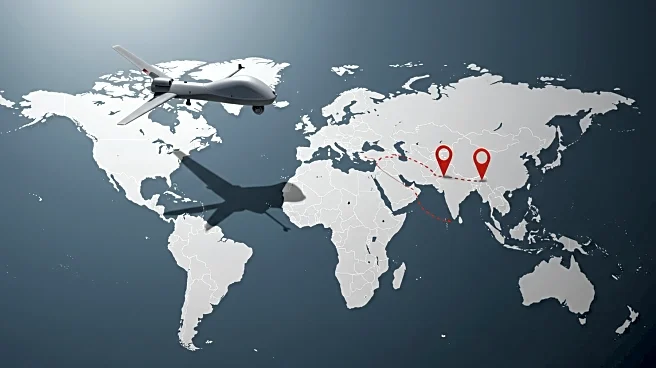What's Happening?
The U.S. recently conducted a military strike aimed at Iran's uranium enrichment facilities, intending to demonstrate deterrence. However, Iran has responded by accelerating its uranium enrichment and considering withdrawal from the Non-Proliferation Treaty. This has led to heightened tensions, with U.S. bases in Iraq on high alert for potential attacks from Iranian-backed militias. The Houthis have threatened Red Sea shipping, and Hezbollah is preparing for possible mobilization. The Islamic Revolutionary Guard Corps has tightened control over Iran's nuclear policy, signaling a shift towards defiance.
Why It's Important?
The U.S. strike on Iran has significant implications for regional stability and global diplomacy. It risks escalating military conflicts involving Iran, Iraq, and Israel, potentially drawing in other regional powers. The strike has also prompted strategic realignments, with China and Russia increasing their influence in the Middle East. Gulf states are reassessing their security alliances, balancing U.S. protection against reputational risks. The nonproliferation regime faces challenges as preemptive strikes may become normalized, affecting global nuclear policy.
What's Next?
The situation may lead to further military confrontations or diplomatic negotiations. Iran might return to talks due to internal pressures or strategic recalibration. Regional deterrence could be reestablished after reciprocal escalations clarify new boundaries. The U.S. and Israel may strengthen ties with moderate Arab regimes, potentially expanding the Abraham Accords. The international community will closely monitor these developments, assessing their impact on global security and diplomatic relations.
Beyond the Headlines
The U.S. strike on Iran could trigger long-term shifts in Middle Eastern geopolitics. It may alter power dynamics, with China and Russia playing more assertive roles. The strike challenges the ethical and legal norms surrounding preemptive military actions, influencing future international policies. The evolving situation underscores the complexity of deterrence and the unpredictable nature of geopolitical conflicts.










